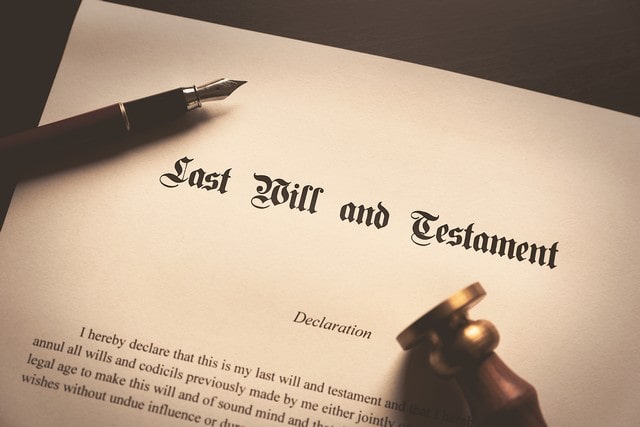Last Will and Testament Lawyers in Maryland
Learn how to create a last will and testament that Maryland residents can rely on. Discover legal requirements, online and electronic will options, and how Seddiq Law Firm guides you from drafting through probate every step of the way.
What Is a Last Will or Testament?
A last will and testament is a written document that tells the court who should receive your property after you die, appoints someone you trust to carry out those directions, and lets you name guardians for children who are still minors. This executed will serves as your final instructions for how your estate should be handled.
Writing these instructions is crucial because, if a person dies without a will (intestate), state intestacy rules decide who gets your assets, which can leave out people or causes you care about. Moreover, nearly six out of ten Maryland adults do not have a valid will, so their families often face extra delays, costs, and stress during probate. This can cause stress and uncertainty for families, especially if the results aren’t what the deceased would have wanted.
A clear will avoids family disputes, protects vulnerable dependents, and keeps control of your legacy in your own hands rather than letting the state decide. At Seddiq Law Firm in Rockville, Maryland, we guide clients through every stage of creating, updating, or probating a will. We prepare plain‑language documents that meet Maryland’s legal requirements, review existing wills for possible gaps, represent families during probate, and step in quickly if disagreements arise.

Legal Concepts and Formalities
Sound Mind and Legal Capacity
To create a valid will in Maryland, you must demonstrate testamentary capacity, meaning you understand the nature and extent of your property, the natural objects of your bounty (family members who would normally inherit), and the legal effect of executing a will. Maryland courts presume that adults possess this capacity unless evidence suggests otherwise.
Execution Requirements
The execution of a will involves specific legal formalities that must be followed precisely. The testator (person making the will) must sign the document in the presence of witnesses, or acknowledge their signature to the witnesses. This signing ceremony, known as the execution, establishes the will’s validity and helps prevent fraud.
Personal Representative Duties
Your will should name a personal representative (also called an executor) who will handle your estate’s administration. This person has significant responsibilities, including gathering assets, paying debts and taxes, and distributing property according to your wishes. Choose someone trustworthy and capable of handling these complex duties.
Maryland Legal Requirements for a Valid Will
Maryland law is clear: you must be at least 18 years old and “of sound mind” to create a will. The will has to be in writing—audio, video, and oral wills aren’t valid. You need to sign the will and have two credible, disinterested witnesses sign it in your presence. These requirements are meant to avoid fraud and preserve your real intentions.
Witness Requirements and Restrictions
Witnesses must be credible individuals who can testify about the will’s execution if needed. Maryland law requires that witnesses be disinterested, meaning they should not receive any benefits under the will. If a witness stands to inherit, their bequest may be void unless there are additional disinterested witnesses or the witness would inherit under intestacy laws anyway.
Self-Proving Affidavit Benefits
A will does not have to be notarized, but notarization makes it “self-proving,” which can make probate much faster and simpler. This affidavit, signed by you and your witnesses before a notary, eliminates the need to locate witnesses during probate proceedings. Maryland law automatically revokes a will if you marry and have a child afterward—unless the will specifically says otherwise.

Electronic and Online Wills In Maryland
Thanks to a 2022 law, Maryland now allows testators to sign wills electronically and have witnesses present remotely. Remote witnessing makes creating a will more convenient, especially when in‑person signing isn’t possible. However, Maryland also requires that a certified paper copy of the will be made and safely stored.
Online platforms are now a practical option for a simple will, as long as they follow all state requirements. For those with complex estates or unique wishes, we’d recommend consulting with an estate planning attorney—errors can mean the difference between a valid will and intestacy.
Key Components to Include In Your Maryland Will
Maryland wills need detailed instructions to ensure assets, children, and end-of-life wishes are honored without confusion or conflict. Planning ahead helps avoid unnecessary delays for beneficiaries, and specifying your intentions in the right way can make probate and estate administration much less stressful for everyone involved.
Essential Clauses and Provisions
Every Maryland will should include an opening clause identifying you as the testator, a revocation clause canceling previous wills, specific bequests of property, a residuary clause addressing remaining assets, and nomination of a personal representative. Additionally, consider including alternate beneficiaries, guardian nominations for minor children, and specific instructions for digital assets.
Contingency Planning
Your will should address various scenarios that might occur. Name alternate beneficiaries in case your primary choices predecease you, designate backup personal representatives, and consider what happens if beneficiaries die simultaneously with you. These contingencies prevent your will from failing to address common situations.
Asset Distribution Under Maryland Law
Types of Property in Your Estate
Your estate consists of probate assets (property titled in your name alone) and non-probate assets (property with beneficiary designations or joint ownership). Understanding this distinction helps you plan effectively, as your will only controls probate assets.
Specific vs. General Bequests
Specific bequests identify particular items or property, while general bequests refer to dollar amounts or percentages. Maryland law has rules about what happens if specifically bequeathed property is no longer in your estate at death (ademption) or if your estate lacks sufficient funds for general bequests (abatement).
Spousal Rights and Elective Share
Maryland protects surviving spouses through elective share laws, allowing them to claim a portion of the estate even if the will provides less. This prevents complete disinheritance of spouses and affects how you can distribute your property.

Understanding Intestacy in Maryland
When Intestacy Laws Apply
Intestacy occurs when someone dies without a valid will, or when a will fails to dispose of all property. Maryland’s intestacy statutes then determine who inherits based on family relationships, following a specific hierarchy that prioritizes spouses, children, parents, and other relatives.
Intestate Succession Order
Under Maryland intestacy law, a surviving spouse inherits the entire estate if there are no surviving children or parents. If children survive, the spouse receives half the estate (or $40,000, whichever is greater) plus half the remainder. This distribution may not align with your wishes, highlighting the importance of having a will.
Impact on Unmarried Partners and Non-Relatives
Intestacy laws don’t recognize unmarried partners, close friends, or charitable organizations as heirs. Without a will, these individuals receive nothing, regardless of your relationship or wishes. Only legal family members inherit under intestacy statutes.
Common Mistakes and How to Avoid Them
People often make mistakes that can cause headaches or disputes for loved ones after they’re gone. One of the biggest pitfalls is letting a beneficiary act as a witness to the will, which can raise doubts or even invalidate their inheritance.
Another common issue is failing to update the will after significant life changes like marriage, divorce, or the birth of a new child. These events can change who counts as an heir or how much someone should receive. Relying solely on generic online templates for complex estates or blended families can lead to vague or conflicting instructions, especially with trusts or digital assets.
Safe but accessible storage is essential. Wills that go missing or are locked away where no one can find them create needless problems—it’s important to let a trusted personal representative or executor know where the latest copy is kept.
Probate and Will Administration In Maryland
The Probate Process Overview
After death, the will should be filed promptly with the Register of Wills. This filing kicks off the probate process, which is how the state ensures that the estate’s assets are properly transferred, taxes are paid, and the testator’s instructions are followed.
Administrative vs. Judicial Probate
The process differs for administrative (uncontested) versus judicial (contested) probate, with the latter requiring more court involvement. Administrative probate is faster and less expensive when beneficiaries agree and no disputes arise. Judicial probate becomes necessary when will contests, creditor disputes, or other complications emerge.
Small Estate Procedures
Maryland distinguishes “small estates”—those valued at less than $50,000, or $100,000 if a surviving spouse is the only heir—which can use a simpler, quicker process. These small estate procedures allow for faster distribution without full probate administration.
Having a self-proving affidavit attached makes things easier for the personal representative, streamlining the process and potentially cutting down on court delays.
Updating, Amending, or Revoking Your Will
Using a Codicil for Minor Changes
Life isn’t static, and our wills shouldn’t be either. Major events—like marriage, divorce, the adoption or birth of a child—often mean automatic changes in your will’s validity or in who stands to inherit. For minor changes, you can use a codicil, which is a formal amendment to your existing will that must meet the same execution requirements as the original will.
Complete Will Revision
For significant changes, creating an entirely new will is often preferable to multiple codicils. A new will should include a revocation clause that clearly cancels all previous wills and codicils to avoid confusion about which document controls.
Methods of Revocation
If necessary, the will can be revoked by physically destroying it—burning or tearing it with intent to revoke—or by making a clear written statement of revocation. Maryland law also automatically revokes or modifies wills in certain circumstances, such as divorce or the birth of children after the will’s execution.
We recommend reviewing your estate plan every three to five years or after any substantial life event. Accurate instructions ensure that your wishes for property, guardianship of children, charitable bequests, funeral wishes, and more are carried out exactly as you intend. This prevents confusion or court disputes among beneficiaries and heirs.
Key Legal Terms Defined
Understanding estate planning terminology helps you make informed decisions about your will:
Codicil: A formal amendment to an existing will that must be executed with the same formalities as the original will.
Intestacy: The condition of dying without a valid will, resulting in state law determining asset distribution.
Personal Representative: The person appointed in your will to handle estate administration, also known as an executor.
Executed Will: A will that has been properly signed and witnessed according to Maryland legal requirements.
Testamentary Capacity: The mental ability required to make a valid will, including understanding your property, beneficiaries, and the legal consequences of your decisions.
Maryland Estate Planning Resources
State Agencies and Offices
The Maryland Register of Wills offices throughout the state provide probate services and can answer questions about the probate process. Each county has its own Register of Wills office with specific procedures and requirements.
Professional Organizations
The Maryland State Bar Association offers resources for finding qualified estate planning attorneys and provides educational materials about wills and estate planning.
Government Resources
The Maryland Courts website provides forms, instructions, and information about probate procedures. Additionally, the Maryland Attorney General’s office offers consumer protection information related to estate planning services.
How Seddiq Law Firm Can Help
Estate planning can feel overwhelming, but our team at Seddiq Law knows how to simplify it. We take pride in connecting with each client to develop a plan that fits their unique needs—no cookie-cutter solutions.
Our attorneys walk you through tough decisions, using our deep knowledge of Maryland law to guide you through every step. Whether your estate is straightforward or more complex, we’re ready to address every curveball.
We also handle probate representation, so if you’re facing the process of settling a loved one’s estate, know you’re not alone. We believe in staying involved—periodic reviews keep your documents updated as life changes.
We keep our fees transparent, so you’ll always know what to expect and won’t face hidden surprises. Our focus is on responsive communication, so your questions won’t go unanswered. Connect with us to discuss your specific estate planning needs—our door is open.
Protect Your Legacy With Seddiq Law Firm
Thinking about what happens after we’re gone is never easy, but making a plan is vital if we want real control over our legacy and how we protect our family. Every detail matters when it comes to a last will and testament in Maryland—missing just one step can let the courts, not you, decide what will happen.
We handle every aspect of your estate planning, from will drafting to setting up trusts and powers of attorney. Our work isn’t just about documents—it’s about making sure your family avoids confusion and costly legal hurdles.
If you have questions or want to start the process, contact us today. Don’t wait—quick action is the key to protecting your wishes before it’s too late.
Frequently Asked Questions
How much does it cost to draft a will in Maryland?
Costs can vary, and DIY options can be tempting, but hiring an attorney means peace of mind and tailored solutions.
Do I actually need a lawyer to make my will?
A lawyer isn’t legally required to create a valid will in Maryland. However, mistakes in DIY wills can lead to confusion or delays later on, especially for families with special needs, blended families, or property in multiple states. It’s wise to check with Seddiq Law Firm before finalizing anything.
What are the requirements for witnesses?
Maryland law requires at least two credible witnesses to observe you signing your will, and they must also sign. Witnesses should not be people who might inherit under the will. If you have questions about meeting these requirements, contact Seddiq Law Firm for help.
Where should I keep my original will?
Store the original in a safe, accessible place like a fireproof home safe or safe deposit box. Tell trusted loved ones where it can be found. If you’re unsure about the right storage option, Seddiq Law Firm can guide you.


